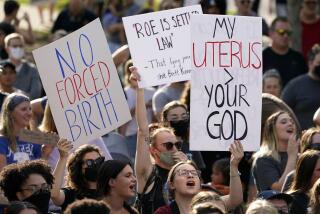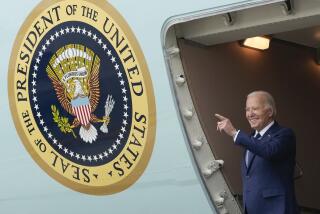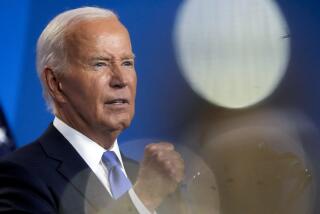An Iowa Primer
- Share via
Iowans have demonstrated that they are not just country bumpkins who know little about anything other than hogs, corn and college wrestling. They have taken the Iowa presidential political caucuses and turned them into a media and political show that far outshines anything that New Hampshire ever did with its traditional first-in-the-nation presidential primaries.
By caucus night on Feb. 8 the Republican and Democratic presidential candidates will have spent more than 1,000 days in Iowa. The media have accounted for additional thousands of days, with attendant spending for hotels, motels, restaurants, rental cars and the like. Something called the “Iowa Caucus Project 88” has been sending material to correspondents and campaigns for more than a year, extolling the virtues of Iowa and offering to facilitate their Iowa efforts.
The caucus project has sent out an Iowa insider’s booklet, an Iowa opinion leaders’ directory and an Iowa background kit offering tips on interesting feature stories about Iowa. Samples: “The world-famous Joffrey ballet has made Iowa City its unofficial central U.S. home” and “Under the ownership of Des Moines realtor Ken Grandquist, minor league baseball made a comeback in Des Moines with the Iowa Cubs.”
Pressure groups from throughout the country have established temporary Iowa offices so that they can lobby candidates in behalf of their causes. Candidates in Iowa no longer can campaign just on farm programs. All this occurs in spite of the fact that the Iowa precinct caucuses are held merely to pick delegates to county conventions that will pick delegates to state conventions that will--finally--pick 52 delegates for the Democratic National Convention and 37 for the Republican National Convention.
Critics claim that the Iowa phenomenon distorts the Democrats’ presidential race in particular because Iowa activists tend to be more liberal than Democrats nationally. Candidates often stake out positions in Iowa that are to the left of where they might otherwise be, because they just cannot risk doing poorly there. Iowa has an image of Norman Rockwell ordinariness. But the “Almanac of American Politics” notes that “economically, culturally and politically Iowa, far from being a typical American state, is atypical almost to the point of being quirky and eccentric.”
So why should quirky and eccentric Iowa be first when it is not terribly representative of American politics as a whole? The once-inconsequential Iowa caucuses used to be in March or April, but were moved in 1972 by Democrats primarily to give the party enough time for its lengthy delegate-selection process. George McGovern, among others, quickly tried to capitalize on the showcase aspect of Iowa. Jimmy Carter used Iowa to gain credibility for his long-shot presidential candidacy. By now the importance of Iowa relative to its delegate strength has soared into the stratosphere.
Is this bad? Not necessarily, although there is considerable grumbling--particularly by conservative Democrats led by former Virginia Gov. Charles Robb who have tried to get the party to focus more on the Southern states’ Super Tuesday primaries on March 8.
Iowa is a relatively small state, so it is possible for an outsider candidate to get some attention by making a respectable showing. A mega-state like California or New York would offer a more diverse population for a first test, but it would be almost impossible for a worthy dark horse to do well in a state where the key was to win votes through a prohibitively expensive media campaign. The same would be true if the presidential season opened with a regional primary similar to the South’s Super Tuesday.
The caucus system also requires a campaign to develop a grass-roots organization. A candidate must not only appeal to the potential Iowa voter, he or she must also motivate supporters to attend precinct caucuses and stand up in front of other caucus-goers and declare allegiance to that candidate. Pre-caucus opinion polls may not be a good guide to the support that the candidate actually will get at the caucuses. Therefore, polls are not likely to produce a bandwagon rush toward one candidate or another as they might in a primary-election state.
The situation in Iowa is not perfect. It never was in New Hampshire, either. But someone has to be first.
More to Read
Get the L.A. Times Politics newsletter
Deeply reported insights into legislation, politics and policy from Sacramento, Washington and beyond. In your inbox twice per week.
You may occasionally receive promotional content from the Los Angeles Times.










